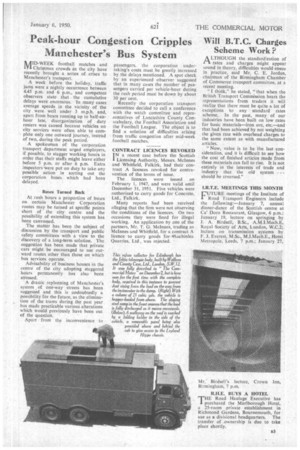Peak-hour Congestion Cripples Manchester's Bus System
Page 37

If you've noticed an error in this article please click here to report it so we can fix it.
It/TM-WEEK football matches and Christmas crowds in the city have recently brought a series of crises to Manchester's transport.
A week before the holiday, traffic jams were a nightly occurrence between 4.45 p.m. and 6 p.m., and competent observers state that the cumulative delays were enormous: 'In many cases average speeds in the vicinity of the city were well under 3 m.p.h, and, apart from buses running up to half-anhour late, disorganization of duty rosters was caused because vehicles on city services were often able to complete only one outward journey, instead of two, during the peak period.
A spokesman of the corporation transport department urged employers, if possible, to stagger working hours in order that their staffs might leave either before 5 p.m. or after 6 p.m. Extra inspectors were put on duty to take.any possible action in sorting out the corporation buses which had been dela yed.
Buses Turned Back At rush hours a proportion of buses on certain Manchester Corporation routes may be turned at specific points short of the city centre and the possibility of extending this system has been canvassed.
The matter has been the subject of discussion by the transport and public safety committees with a view to the discovery of a long-term solution. The suggestion has been made that private cars might be encouraged to use outward routes other than those on which bus services operate.
Advisability of business houses in the centre of the city adopting staggered hours permanently has also been stressed.
A drastic replanning of Manchester's system , of one-way streets has been suggested and this is undoubtedly a possibility for the future, as the elimination of the trams during the past year has made practicable various alterations which would previously have been out of the question.
Apart from the inconvenience to passengers, the corporation undertaking's costs must be greatly increased by the delays mentioned. A spot check by an experienced observer suggested that in many cases the number of passengers carried per vehicle-hour during the rush period must be down by about 30 per cent.
Recently the corporation transport committee decided to call a conference with the watch committee and repre_sentatives of Lancashire County Constabulary, the Football Association and the Football League. The object is to find a solution of difficulties arising from traffic congestion after mid-week football matches.
CONTRACT LICENCES REVOKED I N a recent case before the Scottish Licensing Authority, Messrs. McInnes and Whitfield, Falkirk, had their contract A licences revoked for contravention of the terms of issue.
The licences were issued on February 1, 1947, and were valid until December 31, 1951. Five vehicles were authorized to carry goods for Concrete, Ltd., Falkirk.
Many reports had been received alleging that the firm were not observing the conditions of the licences. On two occasions they were fined for illegal working. An application by one of the partners, Mr. T. G. McInnes, trading as McInnes and Whitfield, for a contract A licence to carry goods for orAuchinlea Quarries. Ltd, was rejected.




























































































